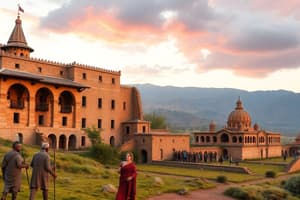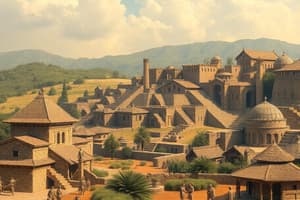Podcast
Questions and Answers
What is the study of past events in human affairs known as?
What is the study of past events in human affairs known as?
- Anthropology
- History (correct)
- Sociology
- Archaeology
Which period follows the Ancient History in the timeline of major historical periods?
Which period follows the Ancient History in the timeline of major historical periods?
- Classical Antiquity (correct)
- Modern History
- Prehistory
- Middle Ages
Which of the following is a primary source?
Which of the following is a primary source?
- An original letter from the time period (correct)
- A documentary film
- A textbook on history
- A biography of a historical figure
Which empire is associated with Classical Antiquity?
Which empire is associated with Classical Antiquity?
What principle established by the Magna Carta is significant in legal history?
What principle established by the Magna Carta is significant in legal history?
What event is considered the beginning of the Modern History period?
What event is considered the beginning of the Modern History period?
Which historical figure was the last Pharaoh of Ancient Egypt?
Which historical figure was the last Pharaoh of Ancient Egypt?
What theme of history primarily focuses on the lives of ordinary people?
What theme of history primarily focuses on the lives of ordinary people?
Flashcards are hidden until you start studying
Study Notes
Overview of History
- Definition: The study of past events, particularly in human affairs.
- Purpose: To understand how past events shape current societies and cultures.
Major Periods in History
-
Prehistory:
- Time before written records.
- Includes the Stone Age, Bronze Age, and Iron Age.
-
Ancient History:
- Begins with the invention of writing (~3500 BCE).
- Major civilizations: Mesopotamia, Ancient Egypt, Indus Valley, Ancient China, Mesoamerica.
-
Classical Antiquity:
- Roughly 500 BCE to 500 CE.
- Notable empires: Roman Empire, Persian Empire, Maurya and Gupta Empires in India, Han Dynasty in China.
-
Middle Ages:
- Approximately 500 CE to 1500 CE.
- Features: Feudalism, the rise of Islam, the Crusades, and the Byzantine Empire.
-
Renaissance and Early Modern Period:
- 14th to 17th centuries.
- Revival of arts and sciences, exploration, and emergence of nation-states.
-
Modern History:
- From the late 17th century to present.
- Key events: Industrial Revolution, World Wars, Cold War, globalization.
Historical Methodology
- Primary Sources: Original materials from the time period being studied (e.g., documents, artifacts).
- Secondary Sources: Interpretations and analyses of primary sources (e.g., books, articles).
- Historiography: Study of how history is written and the different perspectives and methodologies applied.
Important Historical Themes
- Political History: Examines government, political movements, and leader actions.
- Social History: Focuses on the lives and experiences of ordinary people.
- Economic History: Studies past economies and their development.
- Cultural History: Investigates the arts, beliefs, and cultural practices of societies.
- Environmental History: Explores interactions between humans and their environment.
Key Historical Figures
- Julius Caesar: Roman general and statesman.
- Cleopatra: Last Pharaoh of Ancient Egypt.
- Genghis Khan: Founder of the Mongol Empire.
- Mahatma Gandhi: Leader in India’s non-violent independence movement.
- Nelson Mandela: Anti-apartheid revolutionary and former President of South Africa.
Significant Events in History
- The Fall of the Roman Empire (476 CE): Marked the transition to the Middle Ages.
- The Signing of the Magna Carta (1215): Established the principle of the rule of law.
- The American Revolution (1775-1783): Led to the independence of the United States.
- World War I (1914-1918): Major global conflict that reshaped borders and societies.
- World War II (1939-1945): Defined modern geopolitics and resulted in significant global changes.
Impacts of History
- Development of political systems and governance.
- Evolution of cultures and societal norms.
- Influence on technological advancements.
- Legacy of conflicts and resolutions impacting future relations.
Overview of History
- Study of past events, emphasizing human affairs.
- Understanding the influence of past events on today's societies and cultures.
Major Periods in History
- Prehistory: Encompasses the Stone Age, Bronze Age, and Iron Age; occurs before written records.
- Ancient History: Starts around 3500 BCE with the invention of writing; featured civilizations include Mesopotamia, Ancient Egypt, Indus Valley, Ancient China, and Mesoamerica.
- Classical Antiquity: Spans approximately from 500 BCE to 500 CE; notable empires include the Roman Empire, Persian Empire, Maurya and Gupta Empires, and Han Dynasty.
- Middle Ages: Lasts from about 500 CE to 1500 CE; characterized by feudalism, the rise of Islam, the Crusades, and the Byzantine Empire.
- Renaissance and Early Modern Period: Covers the 14th to 17th centuries; marked by a revival of arts and sciences, exploration, and the emergence of nation-states.
- Modern History: Begins in the late 17th century and continues to the present; includes significant events like the Industrial Revolution, World Wars, the Cold War, and globalization.
Historical Methodology
- Primary Sources: Original materials like documents and artifacts from the period studied.
- Secondary Sources: Interpretations and analyses of primary sources, such as books and articles.
- Historiography: Focuses on how history is written, incorporating various perspectives and methodologies.
Important Historical Themes
- Political History: Analyzes government structures, political movements, and actions of leaders.
- Social History: Explores the experiences and lives of ordinary individuals.
- Economic History: Investigates historical economies and their transformations over time.
- Cultural History: Studies the arts, beliefs, and cultural practices of societies.
- Environmental History: Looks into the interactions between human societies and their environments.
Key Historical Figures
- Julius Caesar: Renowned Roman general and influential statesman.
- Cleopatra: Last Pharaoh of Ancient Egypt, known for her political acumen and relationships with Roman leaders.
- Genghis Khan: Founder of the Mongol Empire, noted for his military strategies and empire-building.
- Mahatma Gandhi: Led India's non-violent movement for independence from British rule.
- Nelson Mandela: Anti-apartheid revolutionary who became South Africa's first Black president.
Significant Events in History
- The Fall of the Roman Empire (476 CE): Represents the transition from Ancient Rome to the Middle Ages.
- The Signing of the Magna Carta (1215): Established the principle of the rule of law, influencing later governance models.
- The American Revolution (1775-1783): Resulted in the independence of the United States, affecting global political landscapes.
- World War I (1914-1918): Major global conflict that altered national borders and significantly impacted societies.
- World War II (1939-1945): Major conflict that reshaped geopolitics and led to significant global changes.
Impacts of History
- Shaped the development of diverse political systems and governance structures.
- Influenced the evolution of cultures and societal norms throughout history.
- Played a critical role in technological advancements and innovations.
- Left a legacy of conflicts and resolutions, affecting future international relations.
Studying That Suits You
Use AI to generate personalized quizzes and flashcards to suit your learning preferences.




